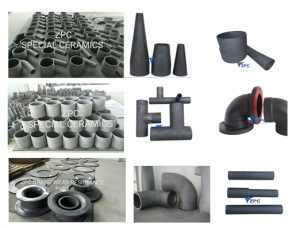Silicon Carbide has excellent resistance to corrosion, high mechanical strength, high thermal conductivity, a very low coefficient of thermal expansion, and better thermal shock resistance than alumincell namet very high temperatures. Silicon carbide is composed of tetrahedra of carbon and silicon atoms with strong bonds in the crystal lattice. This produces a very hard and strong material. Silicon carbide is not attacked by any acids or alkalis or molten salts up to 800ºC. In air, SiC forms a protective silicon oxide coating at 1200ºC and is able to be used up to 1600ºC. The high thermal conductivity coupled with low thermal expansion and high strength give this material exceptional thermal shock resistant qualities. Silicon carbide ceramics with little or no grain boundary impurities maintain their strength to very high temperatures, approaching 1600ºC with no strength loss. Chemical purity, resistance to chemical attack at temperature, and strength retention at high temperatures has made this material very popular as wafer tray supports and paddles in semiconductor furnaces. Thcell namelectrical conduction of the material has lead to its use in resistance heating elements for electric furnaces, and as a key component in thermistors (temperature variable resistors) and in varistors (voltage variable resistors). Other applications include seal faces, wear plates, bearings and liner tubes.
Post time: Jun-05-2018
